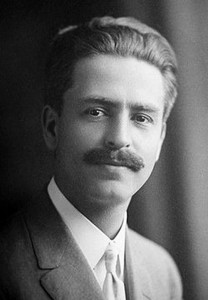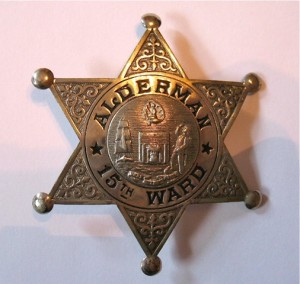 In the spring of 1912, when The John Marshall Law School was in its 13th year, talk around the law school undoubtedly touched on the April 15 sinking of the Titanic, the upcoming Republican Party Convention in Chicago that would be a face-off between President William Howard Taft and former president Theodore Roosevelt, and the city shutting down the infamous Red Light District on the near South Side under the direction of Carter Henry Harrison Jr. who was in his fifth term as Chicago’s mayor.
In the spring of 1912, when The John Marshall Law School was in its 13th year, talk around the law school undoubtedly touched on the April 15 sinking of the Titanic, the upcoming Republican Party Convention in Chicago that would be a face-off between President William Howard Taft and former president Theodore Roosevelt, and the city shutting down the infamous Red Light District on the near South Side under the direction of Carter Henry Harrison Jr. who was in his fifth term as Chicago’s mayor.
John Marshall was a tenant in the Old Portland Block building at Dearborn and Washington Streets, one of the first buildings to rise after the Chicago Fire. It’s not difficult to imagine William Rodriguez, the politically active, 33-year-old John Marshall student, mulling over the news of the day.
The son of a Spanish-born laborer and a German-born mother from rural Wisconsin, Rodriguez was a house painter for more than a decade before he enrolled at the law school. He was just the sort of student John Marshall’s founders envisioned when they created a law school of opportunity that would educate students from every walk of life, not just those of privilege.
Rodriguez was the first student of Hispanic heritage to graduate from The John Marshall Law School. Now, 100 years later, The John Marshall Law School is marking the milestone of Rodriguez’s graduation with a celebration on Nov. 27, 2012. Invited guests will gather at the law school’s Student Commons, 304 S. State St., at 5 p.m.
Speakers at the event include Ricardo Meza (JD ’90), a former assistant U.S. attorney and currently executive inspector general for the Agencies of the Illinois Governor, and Federico M. Rodriguez, president of the Hispanic Lawyers Association of Illinois.
John Marshall Professor Damian Ortiz (JD ‘97/LLM ’04) said, “The graduation of the first Hispanic student from The John Marshall Law School is historic, and the Hispanic legal community is proud to be a part of the celebration.”
Rodriguez would have stood out in the 19 12 graduating class of 57 students: the previous year he had run an unsuccessful Socialist Party campaign for mayor. It was the candidacy itself that stood out, not the Socialist Party affiliation. This was before the Red Scare and at a time when Socialist Party presidential candidate Eugene Debs won nearly one million votes, and Socialists were elected to the U.S. Congress, state legislatures and numerous mayoral positions with the support of trade unions, social reformers and immigrants.
 Rodriguez would go on to become one of those Socialist-elected officials. In 1915 he was elected to the Chicago City Council, where he was Chicago’s first Hispanic alderman and was reportedly one of three Socialist Party aldermen.
Rodriguez would go on to become one of those Socialist-elected officials. In 1915 he was elected to the Chicago City Council, where he was Chicago’s first Hispanic alderman and was reportedly one of three Socialist Party aldermen.
Rodriguez also helped found the Chicago chapter of the American Civil Liberties Union and ran unsuccessfully for a judgeship in 1933. He practiced law well into his 80s and eventually moved to Phoenix, Ariz., where he died in 1970.
A 1981 Chicago magazine article said Rodriguez assumed the role of reformer during his three years as an alderman, becoming a “municipal Cassandra, always heard and never heeded” but that by late 1916 he was “warmly praised by civic reform groups and even touted as likely to become Chicago’s first Socialist mayor.”
But when America’s entry into World War I spawned patriotic hysteria and xenophobia, Rodriguez’s Socialist pacifism became a problem for him politically. He lost the 1918 election by 266 votes.
“Rodriguez was a practical idealist, whose unconventional plans were intended to raise the quality of city living,” the magazine wrote. “In optimistic times, the public tolerates, learns from, and even enjoys the iconoclast. But in the tensions of wartime, no one has time for the dreamer.”
When Rodriguez was alderman, just 2,000 or fewer Chicagoans were of Hispanic descent in a population of nearly 2.7 million. In 2010, almost 30 percent of the Chicago population of, coincidentally about 2.7 million people, was of Hispanic ancestry. (Chicago’s population peaked at 3.6 million in 1950.) From John Marshall’s founding, large numbers of students of color and women were admitted and graduated. Today law schools across the country are following that example.
Alumna Joan Pantsios (JD’75) is related to Rodriguez by marriage. Pantsios, now retired, was a lawyer for many years in the Public Defender’s Offices in Lake and DuPage Counties and also worked for the State Appellate Defender’s Capital Litigation Unit.
Pantsios’ great aunt was married to Rodriguez during the time when he was a city alderman.
“Both my Aunt Sophie and her sister, Pauline, my grandmother, married men who were active in Socialist politics in the teens and ‘20s. Growing up, my sisters and I were always aware that Will Rodriguez was elected to the Chicago City Council as a Socialist Party candidate, and that he was the first Hispanic alderman in Chicago,” Pantsios said. “Will and Sophie divorced in the ’20s, so we never knew him, and the fact that I attended John Marshall is sheer coincidence,” she said.
